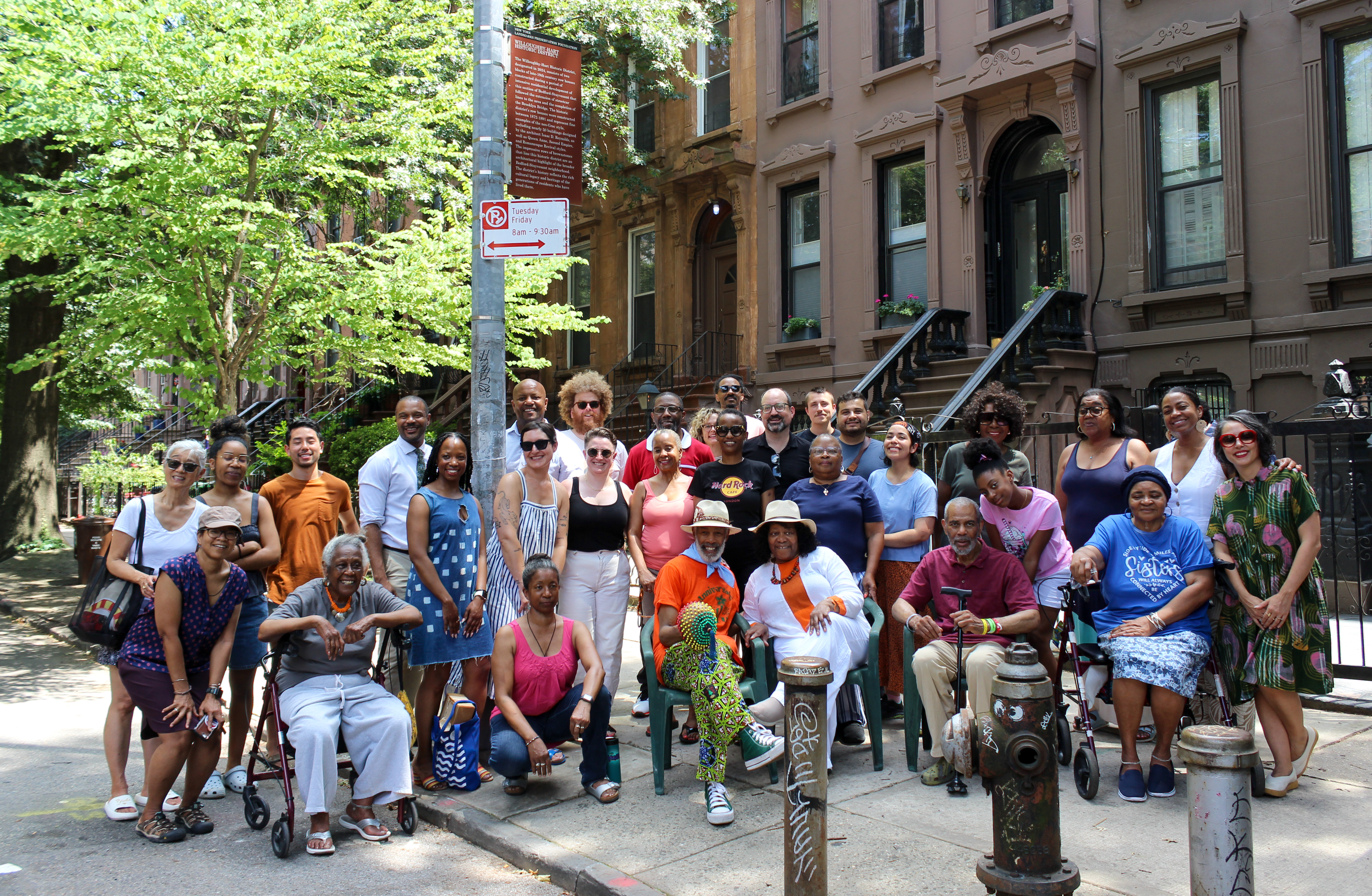Walkabout: Enough of Silly Love Songs
I had planned to wrap up my series on Black Folks in 19th century Brooklyn this time, but came upon some new information that I want to include, and just didn’t have time to process it all in time. It’s important that this is done correctly, it’s such an untold and important part of American…

 I had planned to wrap up my series on Black Folks in 19th century Brooklyn this time, but came upon some new information that I want to include, and just didn’t have time to process it all in time. It’s important that this is done correctly, it’s such an untold and important part of American History. So the conclusion will be next Tuesday. In the meantime, in the course of some other research, I came across this goodie, so as a slight distraction, here’s an interesting tale of a songwriter and the song that gave him fame, a bit of fortune, and a whole lot of grief.
I had planned to wrap up my series on Black Folks in 19th century Brooklyn this time, but came upon some new information that I want to include, and just didn’t have time to process it all in time. It’s important that this is done correctly, it’s such an untold and important part of American History. So the conclusion will be next Tuesday. In the meantime, in the course of some other research, I came across this goodie, so as a slight distraction, here’s an interesting tale of a songwriter and the song that gave him fame, a bit of fortune, and a whole lot of grief.
The end of the 19th and first decades of the 20th century saw a rise in popularity of popular songs and the sheet music that went with it. Manhattan’s 28th street, between 5th and 6th Avenues became the home to hundreds of music publishers; the facades of the buildings there covered with the names of companies that would publish and distribute songs. Each of the five story loft buildings lining both sides of the street could have dozens of publishers; all they seemed to need was an upright piano and a desk in order to go into business. The sound of all those pianos pounding out songs gave the street and the genre its name: Tin Pan Alley.
Even if you are only dimly aware of Tin Pan Alley, many of the songs that came from there are still in American repertoire, even if only as nostalgia. “In the Good Old Summertime,” “God Bless America,” “The Sidewalks of New York, and “Take Me Out to the Ballgame” all are products of Tin Pan Alley composers, the most famous of which was Irving Berlin. Most of these songs are not masterpieces, some were downright awful, but all were catchy and simple, were churned out by the thousands, and printed up and sold to an eager market. If a composer were lucky, a famous performer would make the song their own, and that person’s picture on the cover of the sheet music made it an instant best seller. Everyone enjoyed playing and singing these songs, from vaudeville acts, to barbershop quartets, to amateur choruses, to the person on the street. Music was a part of most people’s lives, just as it is today.
George L. Spaulding was one of these composers. He was born in 1864 in Newburgh, NY, studied piano as a child, and came to Brooklyn when he was sixteen, to study harmony and composition with a local organist. He was talented, and was able to support himself, first as a music clerk, and then in collaboration with others as a songwriter and lyricist. He discovered that he was quite adept at popping out good popular tunes, and soon had success as the composer and writer of tunes such as “The Volunteer Organist,” “Two Little Girls in Blue,” and “Somebody Has My Heart.”
He married a woman named Eva Wood, and they had two children. Eva’s father had a successful coal distributing company, called Thomas Wood & Sons, with an office on Nevins and State Streets. George’s fortunes vaccilated, but he finally hit it big with a song called “When You Know the Girl You Love, Loves You,” which he wrote with William Benson Gray, his sometimes song partner, in 1894. It was a hit. They lucked out even better when the sheet music was published with the endorsement of a popular tenor named David Andrada, whose picture is emblazoned on the cover of the music. And to add to the trifecta, they published the music themselves, cutting out the profits to the middleman; no royalties to one of the hundreds of publishers out there.
George’s career really took off after that, enough to look to the suburbs for a home. The family moved to New Rochelle, in Westchester County; close enough to the city to get to work, but far away from Brooklyn’s noise and dirt. He was not the only creative person in New Rochelle. It was also home to artist Frederick Remington, the great painter of Western scenes, whom George met, rather unfortunately one morning in 1895, when his carriage barreled right into Remington’s, causing the artist and his dog quite a shock. Remington was out for a ride, but George was trying to catch a train, and both of their drivers weren’t looking where they were going. No one was seriously hurt, but Remington sued, and won $45 in a court case for damages. This was the beginning of our songwriter’s run of bad luck.
As we all know today, in popular culture, you are only as good as your last song, so George could only coast on the success of “When you know the girl you love” for so long. By 1901, things weren’t going so well, and the family had to give up New Rochelle and move back to Brooklyn, near Eva’s parents. George was spending more and more time away from home, supposedly composing at his furnished room in a gentlemen’s hotel in Midtown Manhattan. After not seeing her husband for nine months, and not getting any money from him to support herself and the two kids, the oldest now eleven, Eva called the cops on him, to have George arrested for abandonment.
The two officers assigned the case could not locate George, until they got a tip from his angry brother-in-law, who told them where to look. The men were dispatched to Manhattan to arrest George, and found him on 59th and Madison. He asked if they could take him to his rooms before hauling him off to Brooklyn. They agreed, and when they got to the apartment, they found that George, the composer of “When you know the girl you love, loves you,” was much loved indeed. Inside were two young ladies, twins, who were most upset to see George under arrest. There was a lot of crying as the songwriter, husband and cad was taken back to Brooklyn to face his wife.
The judge asked for $300 bail, which was not a small amount, and it was posted by George’s mother. He told the judge that life had been good up in New Rochelle, but when times got bad, they had to move, but he still sent Eva $5 a month. In fact, when the police arrested him, he had just come back from the Post Office, where he had mailed the latest check to her. He also explained that he and his wife were not getting along, and that much of that was due to her temperament, and was not his fault. It was also not his fault that his partnership and publishing business with William Benson Gray had not worked out. He had invested $10,000 to buy several other publishers out, but the deal had fallen through, and the partnership had failed.
There is no follow up in the paper, as to how this all turned out legally, but Eva and George divorced. His name turns up in New Rochelle for many years afterward, and he remarried, this time to a poet named Jessica Moore. George Spaulding really did have a lot of musical talent, in spite of being a cheating dog, and he ended up making a good living composing popular piano pieces, with simple tunes and pleasing harmonies, used in teaching piano to children and beginners. His collections sold well, and he also wrote children’s operettas. His songs and tunes were often accompanied by lyrics provided by his wife. He was considered among the foremost writers of juvenile musical entertainment material in his day.
The Spauldings were a New Rochelle fixture, and he was the president and eager volunteer in local dramatic productions, musical events and concerts. He died in 1921. Today, hardly anyone remembers “When you know the girl you love, loves you.” It’s too bad that George didn’t seem to remember it either, when it counted. I hope Eva and her kids made out fine. Tin Pan Alley seems to have produced a tin heart.
WHEN YOU KNOW THE GIRL YOU LOVE LOVES YOU.
Copyright, 1894, by Spaulding & Gray.
By W. B. Gray & G. L. Spaulding.
You will find this world a pleasure, if the girl you love, loves you,
You will find this world a world of joy and bliss,
Every evening when at leisure, if your love for her is true,
You will meet her and will greet her with a kiss.
As you wander side by side, with your happy promised bride,
With nothing but your wedding day in view,
All is joy and comfort then, what a blessing life is when
You know the girl you love, loves you.
Refrain.
When you know the girl you love, loves you,
If to her you’re faithful, kind and true,
Not a single act you’ll rue, you’ll have peace and comfort, too,
When you know the girl you love, loves you.
All her secrets she will tell you, if the girl you love, loves you,
And her every little triumph you will praise,
For her frankness will compel you, if your love for her is true,
To admire her winsome, charming, pleasant ways.
Then as time rolls quickly on, and perhaps a year has gone,
You’ve tried her love, and found it staunch find true,
You will make of her your wife, you’ll be happy all through life,
You know the girl you love, loves you.-Refrain.
(Sheet music: New York Public Library)





I had to laugh through the whole story- especially when I read about the twins! One thing you have to say about Brooklyn- it produces the best characters! And here I was thinking life was so much simpler than- LOL! Great story, MM. Not your usual serious fare and it was delightful.